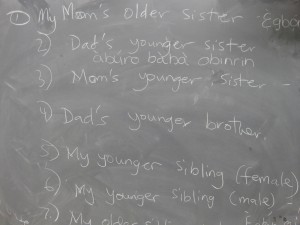 Most students tended to make hasty generalizations from what they read. The book A Mouth Sweeter Than Salt had very many interesting stories from the perspective of the then young and uneducated Toyin Falola and his upbringing, but most who read it tended to think that his story was true for everyone else, e.g. people not remembering their date of birth. This happened last semester as well. Maybe we should bring Chimamanda back.
Most students tended to make hasty generalizations from what they read. The book A Mouth Sweeter Than Salt had very many interesting stories from the perspective of the then young and uneducated Toyin Falola and his upbringing, but most who read it tended to think that his story was true for everyone else, e.g. people not remembering their date of birth. This happened last semester as well. Maybe we should bring Chimamanda back.- Americans wrote the shortened form of the English word for mother as “Mom” instead of “Mum” as I have been used to. I didn’t know this before. I’ve always written it as Mum, until someone from class gently corrected me after I wrote it on the blackboard. Then I gently corrected her too, and voiced my reluctance to ever adapt to American English. They found it amusing.
- One of my students said on Monday after submitting an assignment to write a summary of the life of Wole Soyinka that his mother had met the Nigerian Nobel Laureatte once before, and found him to be brilliant. “Cool,” I said.
- Many students used Yoruban whenever they used Yoruba as an adjective in an English sentence, rather than the usual Yoruba, e.g Yoruban boy, Yoruban culture, instead of Yoruba culture. Yoruba boy etc. I noticed this in the scripts of my Fall semester students last year as well. Do British English people make this generalization as well?
Short Observations from Class was published on January 27th, 2010, with the tags American English, Class, Class session, Single Story, Wole Soyinka, under the Academic, adventures, Fun category. There are currently 7 comments on this article so far.
7 Comments to Short Observations from Class so far. (RSS Feeds for comments in this post)